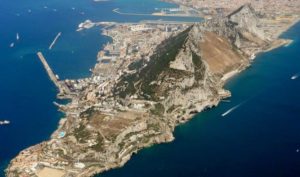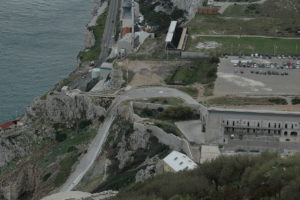As you are possibly aware, TMT has tried to avoid talking about Brexit. We are all subjected to far too much of it in the daily media - mostly of the typically self-deprecating sort that we Brits seem to revel in. (Why can’t we be more positive about this country and our future - regardless of the outcome of current negotiations? ) However, the question of Gib becoming some sort of outpost of Europe under Spanish influence seems a step too far for most to stomach - and we rather agree. We were prepared to fight for the Falklands - so we should be prepared to put up a decent fight to retain control of Gibraltar.

Just as we are beset with unforeseen and largely unnecessary problems trying to come to an agreement over Northern Ireland, so we are faced with a late bid by Spain to hold the Brexit agreement hostage over something that that was never on the table from the outset. It is also a complete red-herring, given that the Chief Minister of Gibraltar has made it very clear that he and his team have been engaged in constructive talks about the Rocks’ relationship with Spain for some time. That said, he recently re-affirmed Gibraltar’s commitment to the UK and especially to the British Armed Forces, in connection with which the Armed Forces (Gibraltar) Act was signed on the 19th of November, leaving no room for doubt as to the strength of the bond between Gibraltar and the UK.

Setting the scene after signing the new act, Armed Forces Minister Mark Lancaster said:
“Gibraltar is of vital importance to the UK Armed Forces and our allies. Whilst our relationship with the EU is changing, our commitment to European prosperity and security remains steadfast and our duty to support Gibraltar, its people and its economy is resolute.”
For his part, Mr. Picardo, Chief Minister of Gibraltar, commented:
“We’ve just passed an Armed Forces Act in Gibraltar to regulate the presence of Armed Forces in Gibraltar from the United Kingdom. The bonds between Gibraltar and the British Armed Forces go back all the way to the Liberation in 1704 when the Royal Marines took Gibraltar and that is not going to change in any way. The Armed Forces have their home in the Mediterranean in Gibraltar.”

So what does the Armed Forces (Gibraltar) Act actually do? Not much on a day-to-day basis, might be the easiest answer. It effectively confirms the application of aspects of the UK Armed Forces Act 2006 to Gibraltar. For those more legally minded, it is:
“An ACT to make provision for the application in Gibraltar of certain provisions of the UK Armed Forces Act 2006, for the application of that Act to the Royal Gibraltar Regiment, for the exercise in Gibraltar of jurisdiction, powers and competences by service authorities and courts in certain circumstances, for the creation under Gibraltar law of certain offences relating to the armed forces and for matters connected therewith or incidental thereto.”
It then goes on to lay out the relationship between civilian and military authorities, mostly dealing with which has jurisdiction over what sort of person and which sort of crime or incident is being addressed. For its part, the Armed Forces Act 2006 brought together the three separate Service Discipline Acts (the Army Act 1955, the Air Force Act 1955 and the Naval Discipline Act 1957) which set out the system of military law under which the UK’s Forces operate.

The significance of the Armed Forces (Gibraltar) Act is that is sends a clear message to anyone (including the Spanish Government of course, that what is good for the UK is good for Gibraltar, and that the relevant legal framework is in place and has been updated to allow British Forces to behave in Gibraltar almost as if they were operating in the UK. It removes obstacles to normal peacetime activities and makes any sort of transition to war seamless. Gibraltar is effectively confirmed as being an extension of the UK mainland for military purposes.
That said, this piece of legislation can be swept away in a heartbeat of the people of Gibraltar and the UK wished it. That is the beauty and weakness of a democratic system. Nothing can ever be “set in stone” - or in Rock in this case. Spain might choose to ignore this and all other Acts and continue to work on the basis that its claim to Gibraltar overrides any legislation of this sort. They would of course simply sweep it away where their claim to be upheld in some sort of international court and the UK ordered to leave.
Spain’s claim to Gibraltar, based on the fact that it was ceded to Britain in 1713, might lead to some interesting problems in the rest of Europe. Belgium, the beating heart of the EU today, was only formed in 1830 when it seceded from the Netherlands. Finland was formed when Russia took that area of land from the Swedes and created the Grand Duchy of Finland in 1809. Germany as we know it was created only in the late 19th Century and parts of that country still resent their domination by the northern federal states. In 1814, after intervention by Britain, Denmark was forced to give up what is now Norway to Sweden. And so it goes on.
Where do we draw the line? At some random date three hundred years ago; or five hundred perhaps? Or we can go further back to the time when England (and not the UK) owned most of France. Why not consider the time when the Holy Roman Empire ruled most of central Europe. But then the Italians might wish to go further back re-establish their Roman holdings across the whole of its middle-empire period – though of course there was no such state as “Italy” at that time, so who is a genuine “Roman” today?
Within reason, and acknowledging the problems the UK faces with the simmering Scottish independence question and Spain has with the Basque region, it is largely up to the “will of the people of a place” as to who they belong to. As long as “the place” is independently viable and “the people” are sufficiently large in number to justify such a declaration. Perhaps more important than the act itself, therefore, is the statement of Gibraltarians that accompanied it:
“The bonds between Gibraltar the British Armed Forces go back all the way to the Liberation in 1704 when the Royal Marines took Gibraltar and that is not going to change in any way.”


Comments on Gibraltar in the Brexit spotlight
There is 1 comment on Gibraltar in the Brexit spotlight
Comment by Blake H. Lindsey
As an American exchange student finishing my bachelor’s degree, I spent several days in Gibraltar as a tourist in the summer of 1994. I loved Spain and its people, but the most stirring moment of the summer, for me, was seeing the large Union Jack flying above the Moorish Castle. I knew my history—why Gibraltar was important, both to the UK and to the rest of Europe—and I knew the struggles and the watchfulness that flag, flying in that place, represented. Gibraltar and the stability it represents was bought with a lot of British blood.
It is my hope that the people of the UK don’t throw that away in a misguided (and fruitless) attempt to “right [perceived] historic wrongs.”
Handpicked links